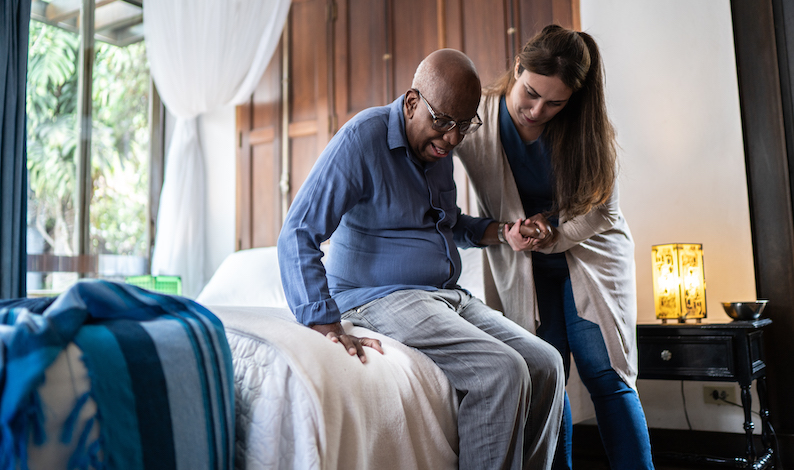
A report recommends ways CMS can address the states’ failures to meet nursing home survey requirements.
Over 1.3 million patients reside in America’s 15,600 nursing homes. States bear the responsibility of ensuring the safety of the vulnerable living in these facilities; however, states have fallen short in their monitoring of nursing home quality, according to a recent report issued by the Department of Health and Human Service’s Office of the Inspector General (OIG).
Even though the Centers for Medicare & Medicaid Services (CMS) oversees nursing homes, states have agreed to monitor nursing home compliance under the Social Security Act. To do so, states conduct a standard survey of each nursing home every 15 months and conduct complaint surveys investigating potential noncompliance with requirements protecting the health, safety, and welfare of nursing home residents.
To determine if states fulfill their surveying requirements, the OIG reviewed state data collected between 2015 and 2018. For these years, the OIG analyzed the frequency of surveys conducted by states, the quality of their surveys, and the effectiveness of state responses following any identified deficiencies.
The OIG found varying degrees of state compliance and performance. One state, Louisiana, scored perfectly on every performance measure during the analyzed time period; however, most states failed at least one performance measure and 28 states missed the same measure or measures for multiple consecutive years.
Of the states’ failings, 41 percent arose because the state failed to survey within the required timeframe for either a high priority claim or standard survey. States cite staffing shortages as the root cause of their timeliness failures. Surveying positions in the private sector offer higher salaries and less demanding hours which, according to states, leaves the states unable to compete for additional staff.
In response to the OIG’s report, CMS claimed that reporting failures do not necessarily indicate poor state performance overall. If a state misses a single survey, the OIG’s results show it has failed on the timeliness measure, but one late survey does not show a “systematic failure,” CMS argued. This defense seems logical, but it runs contrary to the OIG’s report which shows states having serious and persistent problems meeting timeliness requirements.
To monitor and ensure state performance, the OIG made five recommendations: monitor state correction plans, establish enforcement actions, engage with state officials, revise the CMS state operations manual, and disseminate state performance surveys more broadly.
When a state fails a performance measure, CMS requires the state to submit a corrective action plan, however, the OIG found that ten percent of plans were missing and the submitted plans often lacked any details as to how the state would correct the problem. The OIG urged CMS to require “outcome oriented” state action plans and for CMS to monitor the implementation of these plans. CMS concurred with this recommendation.
Even though CMS could use remedies and sanctions, including financial penalties, to enforce state compliance, CMS has rarely used these tools. The OIG recommended that CMS establish guidelines to inform states when CMS will sanction performance problems. The OIG stated that such guidelines should include a principle to determine when CMS will use its last resort sanction: terminating all Medicare and Medicaid funding.
CMS concurred with this recommendation, but CMS also expressed hesitancy to further the use of sanctions. Considering that states cited staffing as the root cause of their timeliness failures, CMS feared that sanctioning the states might only exacerbate the staffing issue.
The OIG found that even in the 28 states that failed survey performance measures for consecutive years, CMS only reached out on three occasions to senior state officials, such as Department of Health Directors or governors. CMS reported that seeking the attention of senior state officials on these occasions was effective as it resulted in performance improvements. Although CMS stated that it only engages with senior state officials as a last resort, CMS consented to do so earlier and more frequently to address persisting state survey issues.
Regional CMS offices use the agency’s state operations manual to determine what actions are appropriate in the event of state non-performance of surveys. The OIG recommended that CMS update the manual to reflect its recommendations, and CMS concurred.
Due to the importance of nursing home surveys to elderly residents and their families, the OIG encouraged CMS to disseminate these performance reports more broadly. CMS currently publishes these reports online; however, parties such as patient advocacy groups and nursing home providers could benefit from direct distribution. CMS responded that it would not follow this recommendation, as its current dissemination follows existing requirements.
Vulnerable members of the U.S. population rely on CMS to ensure that nursing homes are safe. CMS, in turn, relies on states to survey and monitor nursing homes. The OIG report encourages CMS to do more to ensure states fulfill their part of this arrangement, and CMS agreed with four of OIG’s five recommendations for how to make these improvements happen.



